|
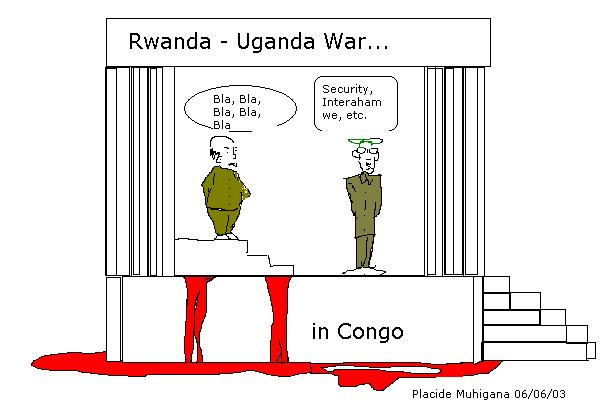
Ituri : 50,000 killed in 4 years
Ethnic clashes in Ituri have killed thousands of people since 1999.
The Hema and Lendu tribal militia signed a ceasefire agreement in
March to allow the IPC to begin its work, eventually leading to the
withdrawal of Ugandan troops from eastern Congo.
Residents of Drodro, which is inhabited mainly by the Hema ethnic
group, said Thursday's attackers spoke a Lendu language.

966 massacred in Ituri An independent radio station in Burundi, African Public Radio, reported
on Thursday that around 440 civilians have been killed in fighting in
the eastern province of Ruyigi since January.
The radio, which has an office in Ruyigi, said the civilians died in
fighting between the rebel CNDD-FDD (National Council for the
Defence of Democracy-Forces for the Defence of Democracy)
and government troops in Gisuru commune in Ruyigi.
Burundi : 440 civilians die.
|
Kanyabayonga - Congo : le Rwanda dément
1. Pas d'uniforme rwandais ! 2. Troupes invisibles ?
(Mazimpaka sur BBC, 03/02/03)
"Dans un communiqué au contenu étrangement préoccupant, les responsables des Nations Unies à Kinshasa rapportaient avoir reçu "d'inquiétantes informations sur des mouvements de troupes et sur une imminente attaque de la part du Rassemblement Démocratique Congolais (RCD-Goma) vers la ville de Kanyabayonga, dans la région nord orientale du Kivu, signalant aussi la présence de militaires rwandais dans la zone de l'Ituri" (Misna 3/02/03)
Démenti, Misna 03/02/03
| Le Général James Kabarebe |
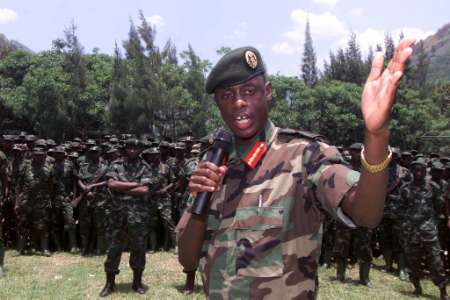
|
| Chef d'Etat Major des FRD (ex-APR) |
C'est reparti comme en 96, 98, etc.
Nos soldats de nouveau au Congo ?
Les observateurs de la MONUC expriment une sérieuse préoccupation également en raison de la présence de troupes ruandaises dans l'Ituri. Les militaires de Kigali, se sont officiellement retirés de l'ex-Zaïre
depuis plusieurs mois et le fait qu'ils soient à présent repérés dans cette zone alimente de fortes peurs, surtout au sein de la population locale.
Misna 1/02/ 2003
AFP, 31 jan 03.
____________________________________________
Un leader du RCD condamné à mort par Kin'
"Maintenant que nous sommes informés de la présence de ce
condamné à Bukavu, un mandat de prise de corps a été transmis au
procureur général près la Cour d'appel de Bukavu afin qu'il soit
appréhendé et mis à notre disposition", a déclaré le procureur général
intérimaire de RDC, Tshibambe kia Pungwe.
Gouv. Xavier Chirimwami
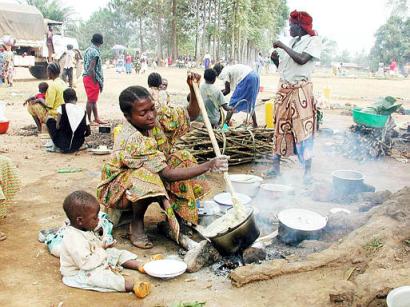
A Congolese woman displaced by fighting in eastern Congo cooking stiff poridge while her young child looks on at the compound of the Roman Catholic church in Mangina, in eastern Congo, on Friday, Jan. 24, 2003. The mother and child and 26,000 other Congolese fled their homes in the region after troops of the rebel Congolese Liberation Movement, or MLC and its allied Congolese Rally for Democracy-National, or RCD-N, began eating rival tribesmen while fighting the Congolese Rally for Democracy-Liberation Movement. The cannibalism is believed to have been calculated to evoke profound terror on foes and was inspired by witchcraft beliefs and deep tribal animosity.
(AP Photo/Rodrique Ngowi)
_____________________________________________________________
Burundi : Hutus, Tutsis tuent tujurs !
C'est le deuxième chef de file de l'opposition tutsie opposé aux
négociations avec les rebelles à être dans le collimateur de la justice
burundaise. L'ancien président du Burundi et président du Parti pour le
redressement nationale (Parena) Jean-Baptiste Baganza est en garde
à vue depuis plus de deux mois.
Mukasi wa Uprona écroué |
 |
|
Security Council Condemns Le Conseil de Sécu condamne "Trois représentants des communautés de l'Ituri, du Nord et du
Sud-Kivu ont demandé aux instances internationales de faire pression
sur l'Ouganda et le Rwanda afin qu'ils cessent leur appui militaire
aux différentes factions armées opérant à l'est de la RDC."
Rw & Ug avec les "Cannibales" ?
Le Rwanda et l'Ouganda ont formé pendant quelque temps dans la région une redoutable
alliance militaire contre le régime de Kinshasa. Les désaccords entre les deux pays ont
néanmoins pris de l'ampleur, à tel point que leurs armées respectives se sont affrontés à
trois reprises en 1999 et 2000 dans la ville de Kisangani, qu'elles occupaient
conjointement à l'époque.
| Le Patron du MLC |
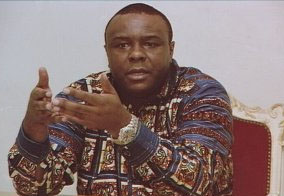
|
| Jean - Pierre Bemba : ça chauffe ! |
"The rebels forced people to consume body parts of their family members," Patricia Tome, MONUC's director of information, said. MONUC said it had received witness reports of rebels belonging to the Mouvement de liberation du Congo (MLC) and its ally, the Rassemblement congolais pour la democratie-National (RCD-N), being involved in
cannibalism and forcible cannibalism.
DRC Cannibalism : Confirmed Ituri LGDL Moi, Kibaki, Kenyatta, KENYA :
BRAVO !
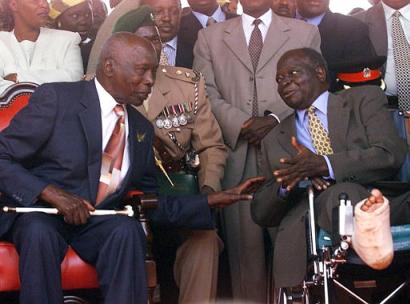
Kenya's newly-elected president, Mwai Kibaki, right, speaks with outgoing President
Daniel arap Moi during Kibaki's swearing-in ceremony in Nairobi, Monday, Dec, 30.
2002.
Veteran politician Kibaki and his opposition alliance were swept into office three days
earlier in general elections won for the first time by the political opposition. Kibaki's
right leg is in a plaster cast following a Dec. 3 automobile accident. (AP Photo/Karel
Prinsloo)
Beni et Lubero : 130 000 déplacés Congo : Noël de Terreur
"Les gens fuient massivement de la zone au nord de Beni (est de la République
Démocratique du Congo) cherchant un abri vers le sud dans la crainte de nouveaux
combats. Les troupes du Mouvement de Libération du Congo (MLC) de Jean-Pierre
Bemba pourraient arriver à Beni dès ce matin. La population locale se prépare à vivre un
Noël plein de peur". Tels sont les mots de monseigneur Melchisedec Paluku Sikuli,
évêque de "Butembo-Beni" (est de la République Démocratique du Congo), contacté par
téléphone par l'Agence MISNA.
APR : Offensive de Noël ? pour les populations de l'Est 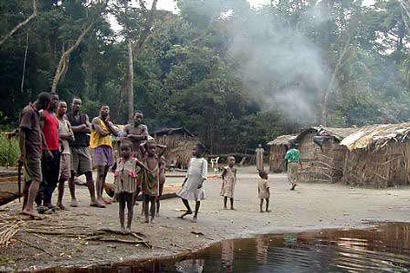
Villagers along the Maringa River in the remote forests of northern Democratic Republic of Congo (news - web sites) suffer from malnutrition and disease in the central African country, where a four year war has killed some two million people, most from hunger and lack of access to basic health care. Negotiations are underway to end Africa's biggest conflict, but improvements will be slow to reach isolated areas in the interior, cut off for years by fighting. This photo was taken November 12, 2002. (Finbarr O'Reilly/Reuters)
- Dec 10 12:41 PM ET
http://minaffet.gov.rw
| RPF SG, Prof. Charles Muligande |
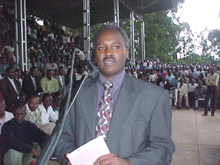
|
| Now, the man in the position does the job. |
Muligande denies re-entry into DRC
NAIROBI, 23 Dec 2002 (IRIN) - The government of Rwanda has denied sending soldiers, posing as returning refugees, to the Democratic Republic of the Congo (DRC) just as its troops were officially pulling out of the country.
Speaking on Rwandan Radio on Saturday, Rwandan Foreign Minister Charles Murigande also said that no Rwandan soldiers had set foot on DRC territory since their official withdrawal. He denied his country's involvement in the movement of the refugees to the DRC.
RPA Christmas Offensive ?
| Désormais Kabila Junior |
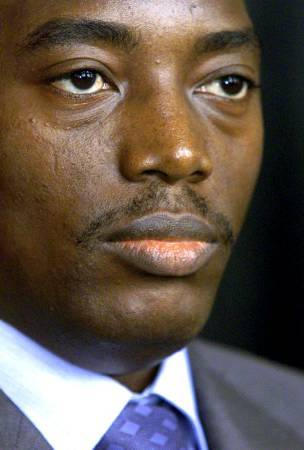
|
| sera flanqué de 4 Vice-Présidents |
Congo
4 VP pour nos voisins
Kigali, Kampala, Kinshasa, Opposition : 1 chacun
(...)Après dix jours de négociations, les parties en présence - gouvernement, rébellion
armée, opposition politique et société civile - ont défini un mécanisme de partage du
pouvoir pour une période de transition de deux ans pendant laquelle Joseph Kabila
conservera la présidence, assisté de quatre vice- présidents issus des quatre grandes
composantes des pourparlers. (...)
Les deux grands mouvements rebelles congolais - le Mouvement de libération u Congo
(MLC, soutenu par l'Ouganda) et le Rassemblement congolais pour a démocratie (RDC,
soutenu par le Rwanda) - ont quant à eux émis des réserves mardi sur les conditions de
sécurité à Kinshasa, siège des institutions u futur gouvernement de transition (...). (AFP)
Accord... de Paix ?! Powersharing President Joseph Kabila will remain in office for the next two years until the
country's first elections since !independence from Belgium in 1960 are held.
He will be assisted by four vice-presidents, respectively representing the
government, the Rassemblement congolais pour la democratie-Goma, the
Mouvement de liberation du Congo (MLC) and the unarmed political
opposition. There will be 36 ministers and 25 deputy ministers, a 500-member
National Assembly and a 120-member Senate.
Renforcement de la Monuc Reconciliation :
Uganda - Rwanda
Amb. C. Umutoni Nyinawumwami Chaos au Congo Des "APR" par milliers au Congo ?
| Paul Kagame, Thabo Mbeki and Joseph Kabila |

|
| On Nov. 1 in Pretoria, S. Africa |
Kagame on looting Congo 90 jours accordés à Kabila
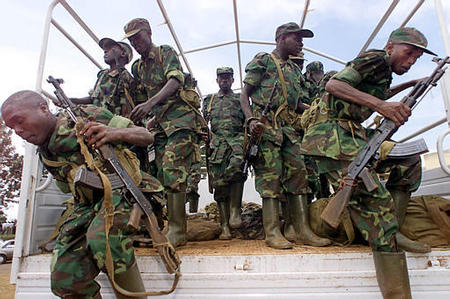
|
| Les vainqueurs et... |
Mardi 1 octobre 2002, 22h17
Rwandan soldiers jump of a truck in the eastern Congolese town of Bukavu as they
prepare to withdraw from the Democratic Republic of Congo, Tuesday Oct. 1, 2002. Seeking to conclude the withdrawal of its troops from war-ravaged Congo by the end of
the week, Rwanda began pulling out nine battalions from the border province of South
Kivu . The withdrawal was agreed under a July 30 peace deal signed by Rwandan
President Paul Kagame and Congolese President Joseph Kabila in South Africa.(AP
Photo/Karel Prinsloo)
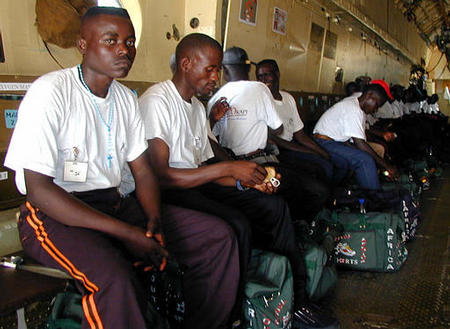
|
| les vaincus? |
Mardi 1 octobre 2002, 2h00
Former Rwandan Hutu rebels sit on a United Nations plane as they wait to leave the military Congolese base of Kamina, in Katanga province, Monday, Sept. 30, 2002. The UN flew 80 rebels to Kigali from Congo Monday in a bid to help reconciliation in Rwanda and push forward the peace process in war-ravaged Congo. (AP Photo/Blaise Musau)
17 mai 1997, Kabila Roi du Congo
| David et Goliath |
|
|
| (Photo BBC) |
5 ans après la prise de Kin', le Rwanda s'incruste au Congo
Au début du mois de mai 1997, une large coalition de forces d'Afrique Centrale et Orientale menée par le Rwanda a chassé du pouvoir un Maréchal Mobutu Sese Seko mourant et abandonné de tous. Le 17 mai, le guérillero professionnel Laurent Désiré Kabila était fait Roi du Congo avec l'approbation euphorique de tous ses voisins et la bénédiction tacite de la communauté internationale. Le pays redevenait le Congo, après s'être débarrassé de l'appellation choisie par le régime du « Président à vie » Mobutu. (pour l'intégralité du commentaire contacter pmuhigana@yahoo.fr)
| Guérilleros-Présidents Kagame et Museveni |
|
|
| Les "hommes forts" de la région |
Explications sur les relations entre l'Ouganda et le Rwanda
Chers camarades dans la lutte pour la construction du Rwanda,
Ces derniers jours, les autorités ougandaises se livrent à des activités nuisibles au Rwanda et nous pensons qu'il est utile de vous tenir au courant pour que vous compreniez (la situation) et pour que vous puissiez y faire face; l'expliquer aux autres rwandais ainsi qu'aux étrangers. D'un autre côté, on ne peut savoir jusqu'où ira le harcèlement continu de la part de l'Ouganda, parce que lorsqu'ils ont commencé à nous tirer dessus la première fois à Kisangani c'est ainsi que ça a commencé en août 1999. Il se peut que cette fois-ci, ils nous attaquent au Rwanda même. (pour la traduction complète, contacter pmuhigana@yahoo.fr)
Urundi Rwanda Charles Murigande, Secretary General of the ruling Rwandan Patriotic Front on Congo
INTERVIEW:
In a peace deal reached last week, the government of the Democratic Republic of Congo promised to disarm and arrest thousands of Hutu rebels, or interahamwe, and ex-members of the Rwandan army, the FAR. In return, Rwanda will withdraw the estimated 30,000 troops currently hunting them down in the eastern Congo.
But the 90-day timetable allocated for arresting and disarming the Hutu militias has provoked considerable scepticism, with many doubting that Kinshasa has the reach and capacity to fulfill its side of the bargain. Those doubts have deepened with news that Rwanda's proxy in Congo, the Rassemblement Congolais pour la Democratie (RCD-Goma), has charged that the Kinshasa government is continuing to arm Rwandan Hutu rebels.
AllAfrica's Charles Cobb Jr. spoke to Charles Murigande, Secretary General of the ruling Rwandan Patriotic Front.
Is it reasonable to expect the Congolese government of Joseph Kabila to be able to round up the Interahamwe and ex-FAR in a 90-day period?
I think it will depend on will. If they have the will, they can achieve that because it really isn't a very complicated matter - although it seems to everybody who is an "expert" on Congo to be a complicated matter.
You know, if you really look at what has been happening during the last four years we have been capturing a lot of ex-FAR and Interahamwe. We have even been receiving those who voluntarily report to us and we have been integrating some of them - many of them - into our army. So this has definitely sent a message to many of those who are still fighting us from Congo, many of those who are on the side of Kabila, that they are welcome in Rwanda. But of course, many of them are not in a position to walk out of the Kabila camp and come and join us because an army has a structure, an army has a leadership and it is the leadership which is unwilling to voluntarily disarm and report back because many of them are implicated in the [1994] genocide.
So if really Kabila or the Kinshasa government wants to disarm these genocidal forces, we would like for them to arrest this leadership. If they arrested the leadership, the middle rank - officers and the rank and file - would be willing to voluntarily disarm and be repatriated. And I don't really think that it is very difficult to arrest the ring leaders, if they wanted to do that. Now they may be asking, 'How can you turn around and arrest somebody who has been fighting with you and who has been defending you?' It is probably a moral problem they have; it isn't a practical problem.
Do you think they are committed to making the effort now?
I really don't know.
I am really asking for your assessment of the sincerity of Congo President Joseph Kabila in signing the agreement in South Africa.
I cannot know what is in the head of Kabila. I would simply accept the stated sincerity from Kabila and wait and see if this stated sincerity is translated into action. I don't think it would be wise for me to say he wasn't sincere. It is only after facts that I would be able to say he was sincere or he wasn't sincere.
Again we're back to the practical question. We often think of the Kabila government as essentially a Kinshasa government. The interahamwe and ex-FAR are spread across a huge area of Congo. Does he have the capacity?
If you want him to arrest everybody that is in the Congo at once, I don't think there is any nation in this world which would be able to do that. But you can cripple the capacity of these ex-FAR and Interahamwe to fight if, as I said, you arrest the leaders, you stop giving them ammunition, supplying them new arms; these people will be unable to fight. They will voluntarily abandon the armed struggle because they will no longer have the capacity to fight.
So we aren't really insisting that the Kabila regime should arrest everybody - probably that would take forever, knowing the jungles of Congo. But if somebody is lost in the jungle of Congo and has no ammunition, has no food, nothing, he will no longer be a threat to Rwanda.
So there are things that the Kinshasa regime can do which would put an end to the threat that is constituted by these forces.
What about the RCD-Goma (Congolese Rally for Democracy based in the town of Goma) which is seen as allied with Rwanda, your government? Will they come into the peace process now?
You know the RCD has always desired to be a part of any peace process. The peace process must produce a result that is balanced in terms of power-sharing, must put in place a transitional arrangement that is broad-based, that is inclusive. That has always been the position of the RCD and if there is a will on the other side I don't think RCD is going to be a stumbling block to a peaceful resolution of the conflict. I don't think the fact that Congo and Rwanda have signed a peace agreement changes the position of RCD because the position of RCD has been a principled one all along.
As you look ahead, are you optimistic that we're now on the road to some sort of end to this lengthy conflict?
I always tend to think that human beings are good by nature and that they mean well, so if I apply this to the leadership of Congo definitely anyone who aspires to lead the Congo will be desirous of peace in his country. I have no reason not to believe that the leadership of the Congo desires peace in their country.
And what makes the agreement reached in South Africa different from the Lusaka Accords?
It establishes a monitoring mechanism. South Africa and Kofi Annan, as the United Nations Secretary General, are required to put in place a monitoring system so as to know at every step that so-and-so has done its part or so-and-so isn't doing what he's supposed to do. Congo is a big place. Any monitoring mechanism to be efficient will require a lot of means - I don't think South Africa is in a position to foot the bill alone, so probably the international community can help in that.
And if there are countries within the international community - the US, France, UK - who want to join the monitoring mechanism they can join and where they think there is a need to increase the presence of the international force, or even to change the mandate of a UN force, then they can devise a way to do that. So it is important to have the involvement of the international community. Congo is in a mess partly because of the role of the international community. It can't be put right without the international community's involvement.
August 8, 2002
Posted to the web August 8, 2002
Charles Cobb Jr.
Washington, DC
Rwandans wage a war of plunder
Witnesses say occupying troops are spinning out the
violence to grab Congo's riches
Observer Worldview
James Astill in Kigali
Sunday August 4, 2002
The Observer
Rwanda is cynically prolonging its violent occupation
of eastern Congo in order to plunder its mineral
riches, an investigation by The Observer has
suggested.
Eyewitnesses, intelligence officers, human rights
workers and diplomats say that the precondition for
Rwanda's withdrawal contained in the peace plan signed
last week is largely a pretext.
Under its agreement with the Democratic Republic of
Congo to end a war estimated to have cost three
million lives, Rwanda promised to withdraw its troops
once Hutu militiamen had been disarmed. But the
consistent testimony of observers, including diplomats
from countries formerly sympathetic to Rwanda, says
that its government is grossly exaggerating the
numbers of the Interahamwe militiamen, who carried out
the 1994 Rwandan genocide before fleeing there. Its
efforts to round them up, they say, are dubious at
best.
Many accuse Rwanda soldiers of collaborating with the
Hutu militiamen to maintain their excuse for occupying
Congo and plundering a mineral-rich expanse 27 times
the size of Rwanda.
'The Rwandans invaded Congo to chase the Interahamwe
and found themselves lords of the land,' said a senior
North American diplomat in Kigali. 'The Interahamwe is
now a very convenient excuse for Rwanda to loot Congo.
Maybe it's 20 per cent threat, 80 per cent for show.'
Eastern Congo was lawless before Rwanda invaded four
years ago to round up the Interahamwe. Now resistance
fighters and bandit gangs rule, fighting each other
and preying on civilians.
Rwanda's soldiers and the rebels it created and
controls are at the forefront of the killing, says
Human Rights Watch, 'regularly slaughtering civilians
in massacres'.
All factions stand accused of atrocities. But because
most militias were formed to resist Rwanda's
occupation, Rwanda bears most responsibility,
diplomats say. 'It's clear to us the killing continues
because Rwanda refuses to leave Congo. Rwanda must
leave eastern Congo,' said a French diplomat in
Kinshasa, Congo's capital.
Congo's government has maintained the Interahamwe's
threat to Rwanda by supplying them with arms. But,
with its army incapable of resisting Rwanda's
efficient troops - who captured Kinshasa in May 1997
and almost again in August 1998 - many diplomats in
the region describe this as a legitimate military
tactic.
'What should the Congolese do?' said a North American
diplomat in Kinshasa. 'They're under attack... it's
the rules of war.'
Rwanda says 55,000 of the Interahamwe are hiding in
Congo, either in the forests of the east or the ranks
of Congo's army. According to the International Crisis
Group, a privately funded organisation working to
resolve conflict, the true figure is less than half
that, with as few as 8,000 remaining in occupied
eastern Congo. Up to 90 per cent of these were
recruited from refugee camps after 1994, the group
says - so only a small proportion were involved in the
genocide.
'The Interahamwe remains a threat to be dealt with,
but is not a threat to the Rwandan regime,' said the
Kigali diplomat.
The success of the plan signed last week depends on
both sides co-operating with the UN mission in Congo
to disarm the Interahamwe. So far, this effort has
been hampered by the expulsion from eastern Congo of
the UN's most proactive political officer, who was
accused by a Rwanda's rebel proxies of launching a
grenade attack on a Catholic church.
Other UN political officers cite lesser examples of
Rwandan obstruction. They claim to have been prevented
by Rwanda's rebels from meeting General Joseph Padiri,
a Congolese resistance leader fighting alongside the
Interahamwe. 'The Rwandans are very good at paying lip
service and then throwing a spanner in the works,'
said one UN officer. 'How serious are they about
solving the Interahamwe issue when they seem to be
fighting everyone in eastern Congo except the
Interahamwe? Their security concern has become a
joke.'
Patrick Mazimhaka, Rwanda President Paul Kagame's
special adviser on the Great Lakes, told The Observer
that Rwanda's campaign against the Interahamwe was
continuing. 'We are pursuing the Interahamwe. These
battles in eastern Congo have not ceased,' he said. As
evidence of this, Mazimhaka said several of the
Interahamwe were recently captured near the town of
Mwenga.
But refugees from Mwenga arriving in the border town
of Bukavu said there had been no recent fighting
between Rwandan soldiers and the Interahamwe - only
repeated looting under the noses of the Rwandan
garrison.
Refugees, fighters from all factions, and Western aid
workers from Ngendo, Kilungutwe, Kilambi, Kasika and
Kamituga in the Mwenge region, from Katasumuva near
the Kahuzi-Biega national park, and from Walikale all
accused Rwandan soldiers of collaborating with their
supposed enemies.
At a recent meeting with UN officers in Tanzania, the
commander of the Interahamwe's Mwenga-based Tanganyika
brigade, who calls himself Saddam Hussein, alleged
that Rwandan soldiers supplied him with arms. Bahati
Pole Pole, 25, a Rwandan-trained, rebel fighter
stationed in Kamituga, said his orders were no longer
to pursue the Interahamwe. 'Rwanda came here to fight
the Interahamwe but its objectives have changed,' he
said. 'These days, we only pretend to fight them -
it's all politics.'
According to Marie-Joe Bonnet, a French surgeon
working with the Catholic Church, Rwandan soldiers and
Interahamwe militiamen co-exist peacefully around the
goldmines near her clinic in remote Lwinja. 'If the
Rwandans wanted to round up the Hutus, they could have
done so long ago,' she said. 'But they just want to
control the country - where there are no riches, there
are no Rwandans.'
Only Britain, Rwanda's biggest donor and staunchest
ally, remains uncritical of its occupation of eastern
Congo. Clare Short, the Overseas Development
Secretary, has made Rwanda 'a special case for
international assistance', receiving around £30
million of British aid every year. She has
consistently refused to comment on its alleged
atrocities and long-term ambitions in Congo, and
refused to comment on this report.
'My fear is that Britain is going to end up an
international pariah because of its support for
Rwanda,' said a senior British official in Kinshasa.
'We've got to think about who we're backing.'
|



